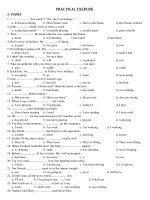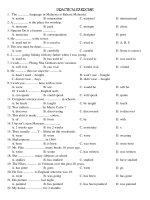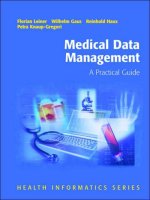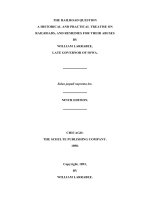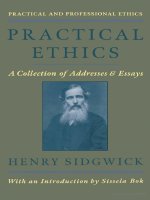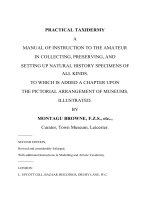PRACTICAL QUANLITY.doc
Bạn đang xem bản rút gọn của tài liệu. Xem và tải ngay bản đầy đủ của tài liệu tại đây (60.63 KB, 2 trang )
I). Choose the correct words in the following sentences:
1. He doesn’t have (many/ much) money.
2. I would like (a few/ a little) salt on my vegetables.
3. She bought (many/ much) cards last night.
4. There are (less/ fewer) boys in this class than in the next class.
5. There is (too many/ too much) information.
6. Would you like (less/ fewer) coffee than this.
7. This jacket costs (too much/too many).
8. I don’t want (some/any) eggs but I want (any/ some) cheese.
9. Is there (some/any) water in glass?
10. (How much/How many) pounds of butter does she want?
11. (How much/ How many) butter does she want?
12. Is there (some/any) tea in the cup?
13. Peter doesn’t want (something/anything) to do.
14. I can speak (a few/ a little) English.
15. They don’t need (some/ any) coffee.
16. I can’t buy that house because I have (few/ little) money.
17. They have given (a large number of/ a great deal of) time on training.
18. The teacher found (a large number of/ a great deal of) mistakes in his writing.
19. I can drink (a few/a little) wine.
20. Give me (a few/ a little) examples.
II. Fill in each blank with MOST or MOST of:
1. ______________Teenagers can hardly find a suitable job.
2. There are 50 students in my class ______________ them ca hardly find a suitable job.
3. ______________ the time he spend on learning was fairly reasonable.
4. ______________ men and women apply for that job, but ______________ them aren’t quanlified.
5. She gave her energy to science.
III. Fill in each blank with A GREAT DEAL OF and A LARGE NUMBER OF:
1. ______________ learner’s attention should be paid to be used of the English Tense.
2. ______________ today scientific work is involved in the use of computer.
3. ______________ people him as a devoted doctor.
4. He loved so ______________ fun that many of his lessons were never well prepared.
5. She is very rich. She has ______________ money in the bank.
6. ______________ goods were sent to the exhibition.
7. They have found ______________ mistakes in the accounts.
8. Mr. Green has spent ______________ time in HO Chi Minh City.
9. I have got ______________ homework to do today.
10. ______________ trees are cut to make paper every day.
III. Fill in each blank with MUCH (OF) or MANY (OF):
1. Please buy ______________ soap.
2. How______________ money do you got?
3. Are ______________ your photos in color or in black and white?
4. She put too ______________ sugar in the coffee.
5. Thank you very ______________ for your help.
6. He wrote plays, but ______________ his played couldn’t be staged.
7. Do you have exercises to do today? Oh, too______________ .
8. How ______________ time do you spend on learning English every day?
9. How ______________ these children are qualified for the job?
10. She doesn’t know ______________ about what to do in response to his kind-heartedness.
VI. Fill in each blank with FEW LITTLE : ít không đủ/ A FEW/ A LITTLE: ít nhưng đủ
1. Can you speak French? Just ______________ .
2. I had _____________ to look after my children.
3. She just spent _____________ money on her clothes.
4. He is not popular. He has _____________ friends.
5. The window is so small that the room gets _____________ air.
6. I find it easy to learn English because I have _____________ books for my study.
